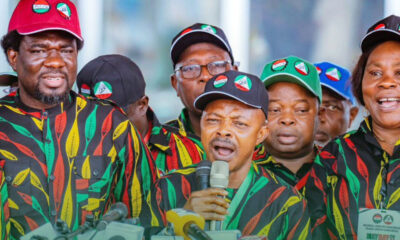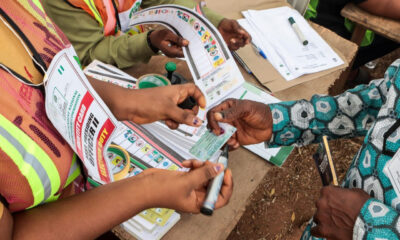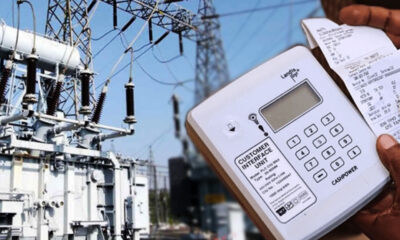Business
Electricity tariff hike: Labour, Discos on collision course

Electricity tariff hike: Labour, Discos on collision course
The Nigeria Labour Congress, power distribution companies, and the Nigerian Electricity Regulatory Commission are heading for a collision course over the planned hike in the tariffs payable by electricity consumers nationwide.
Although power distribution companies and the NERC have not officially confirmed the planned increase, the Multi-Year Tariff Order of the regulator, which explains tariff reviews in the sector indicates that electricity tariff is meant to be reviewed every six months.
This implies that the tariff being paid by power users currently, will be reviewed and a new tariff will take effect from July 1, 2023.
In reviewing the tariff, based on MYTO, the NERC considers various economic factors. They include inflation rate, foreign exchange rate, available power generation capacity, gas price, and, capital expenditure adjustment.
Operators project that the high rate of inflation, coupled with the recent floating of the naira against the dollar, among other factors, will lead to an estimated rise of about 40 per cent in electricity tariff by July 1, 2023, should the MYTO be implemented.
READ ALSO:
- ‘Japa’ good for Nigeria, says Peter Obi
- FG releases 10 high-yield crop varieties to farmers to enhance food sufficiency
- Naira drops further against the dollar; exchanges at N765.13
Reacting to this, the NLC, on Thursday said the plan to increase electricity tariff by 40 per cent by July 1 “was both insensitive and callous and reflects an organised indifference to the wellbeing of consumers, especially, the poor ones.”
NLC kicks
The NLC President, Joe Ajaero, stated that the massive increase was explained away as a response to the over 100 per cent increase in the pump price of Premium Motor Spirit, popularly called petrol.
“Details reveal a movement in inflation from 16.9 per cent to 22.41 per cent (threatening to needle at 30 per cent), and a shift in the exchange rate from N441 to N750 (per dollar).
“We believe that not even these figures are a justification for this reckless proposed tariff increase. The issue of capacity to pay and quality of service delivery is not only germane but superior to any rationalisation by market logic,” Ajaero stated in a statement from the labour union.
He also pointed out that the service providers in the power sector were performing far below expectations, and accused power distributors of hiking tariffs surreptitiously.
He added, “The service providers in spite of sundry support have not been able to meet the threshold of 5,000 megawatts. Coupled with this, there have been surreptitious increases without notice in violation of statutes.
“The inherent risk in the new regime of tariff is that there is no control, implying that by August, consumers will pay new rates. The other risk is that by the time other products or service-rendering entities come up with their new prices or rates, the ordinary person would have been compacted into dust.
“We would want to advise the apostles of the market who have called the NLC all sorts of names to check their conscience. The rate at which they are going is highly combative and combustible,” Ajaero stated.
READ ALSO:
- Lagos State govt, Sanwo-Olu gifts N10m to LASU’s best graduating student
- African Countries Suffering Debt Hangovers – Macron, UN
- Saudi Arabia’s lavish recruitment drive rolls on despite Messi miss
He noted that with contemplation of payment of school fees in tertiary institutions and increases in privately-owned ones, in addition to other costs and tariffs on the way, “life in Nigeria could truly be Hobbesian.”
He said, “The market economies which the market fundamentalists seek to emulate, have in place socio-economic safeguards which we do not have. In light of this, our advice is that this proposed tariff hike should be shelved for our collective safety.”
NERC’s tariff adjustments
The NERC is responsible for regulating electricity tariffs in Nigeria, as it periodically reviews and adjusts this based on various factors such as inflation, exchange rates, gas prices, and the cost of operating the power sector.
It introduced the Multi-Year Tariff Order, which is aimed at ensuring cost-reflective tariffs in the Nigerian electricity market. Under the MYTO, electricity tariffs are scheduled to increase gradually over time to cover the actual cost of generating and distributing electricity.
The commission, for instance in its MYTO 2022, explained that in line with the subsisting MYTO methodology, some indices with potential impact on electricity rates were considered, adding that these indices would be reviewed every six months.
“These indices shall be reviewed every six months to update the tariffs with changes in the indices as applicable in line with the MYTO methodology,” the regulator stated in MYTO documents issued to Discos.
The indices identified in the MYTO 2022 document include Nigeria’s inflation rate, foreign exchange rate, the United States’ rate of inflation, available generation capacity, gas price, CAPEX (capital expenditure) adjustment, as well as other changes.
READ ALSO:
- (BREAKING)Eid-El-Kabir: There are plans to attack worship centres, other – DSS
- Police Invite ‘Trinity Guy’ for asking minor about penis colour in video skit
- Pastor in court for allegedly defrauding Landmark varsity
However, the MYTO methodology met with mixed reactions from Nigerians. While some argued that it was necessary to improve the financial viability of the power sector and attract investments, others expressed concerns about the impact of tariff hikes on consumers, particularly in terms of affordability.
It must be noted, however, that electricity distribution companies play a role in the implementation of electricity tariffs. They are responsible for billing customers and collecting payments for electricity consumed. The Discos also bear the brunt of customers’ reactions when tariff adjustments are made.
Discos await NERC
The Executive Director, Research and Advocacy of the Association of Nigerian Electricity Distributors, Sunday Oduntan, told our correspondent that Discos would only act based on instruction from NERC.
Oduntan, who initially insisted on not commenting on the matter, refused to confirm whether Discos had been given the go-ahead to hike the power tariff beginning from July 1, 2023.
“The people to be called on tariff are those in NERC, not us. I cannot explain to Nigerians because I am not the regulator. It is the regulator that determines tariffs by looking at the indices of the economy, not us.
“We also wait on them. Anything to do with tariffs is determined by the regulator and not the operators,” he stated.
When asked whether the NERC had given the Discos the approval to raise the tariffs, Oduntan replied, “When they tell us to do this, then we follow that instruction.”
NUEE opposes hike
But the acting General Secretary of the National Union of Electricity Employees, Dominic Igwebuike, said any move by Discos or the NERC to hike tariffs would be resisted by electricity workers.
READ ALSO:
- Notorious gang leader, Kabir Bala gun down hours after Kogi govt revoked his pardon
- Residents shot dead, houses burnt as gunmen invade Kogi in fresh attack
- Foreign investors may return as FG plans forex injection into economy
He stated, “We are just yelling over the more than 100 per cent increase in petrol price, now they are talking about a 40 per cent increase in electricity tariffs. Can you imagine that? And this is about the sixth time they are increasing it since the sector was privatised.
“The NUEE condemns it in totality. It is unacceptable and it shows that the government does not care about the feelings of the poor masses. They are not talking about increasing generation capacity but raising tariffs. It is very sad,” he said.
Speaking on what the union would do if the Discos should implement the proposed hike, Igwebuike said, “We want to see what will happen. If it comes to that, we are going to know what to do. We are going to consult ourselves to see the next line of action if that is done.”
The NERC, however, did not comment on the issue, as its spokesperson, Usman Arabi, said he was out of the country, while other officials at the commission refused to speak on the matter when contacted.
But the Chairman of the Lagos State chapter of the Nigerian Association of Small and Medium Enterprises, Solomon Aderoju, in an interview with The PUNCH, said any increase in electricity tariff would spike production costs and consequently exacerbate the plight of the MSMEs.
He said, “It is going to cause problems in the MSME environment because it is going to increase the cost of production. We are facing very tough times now because of what is happening with petrol and diesel.
“Even the exchange rate is gargantuan now. This electricity tariff hike is going to lead to an increase in the cost of production and already, our cost of production is too much to bear. Unfortunately, the cost of borrowing is also high. The MPR (monetary policy rate ) is now 18.5 per cent. No MSME can thrive under these circumstances. The rate of inflation is 22.41 as of today. MSMEs are facing very turbulent times now.
On his part, the Deputy-President of the Lagos Chamber of Commerce and Industry, Gabriel Idahosa, rejected the proposed hike, noting that it would negatively impact the productive sector of the economy.
Idahosa said, “ How can they do that? Industries are already coping with so many dimensions of inflation in costs. This will be another heavy layer on them. It is going to be a serious burden to the issues that businesses are already facing.”
READ ALSO:
- FG cannot afford to take additional loans, DMO warns
- Two-year-old boy accidentally shoots and kills his pregnant mother with gun left on nightstand
- Eidel-Kabir: Subsidy removal, naira devaluation hike Ram price
Similarly, the national Vice President of the Nigerian Association of Small-Scale Industrialists, Segun Kuti-George, condemned the proposed hike. He, however, stated that if the hike is accompanied by increased supply that would drive down the reliance on alternative energy sources for production needs, the productive sector of the economy would be better for it.
Meanwhile,, persons living with disabilities have called on the Lagos State Governor, Babajide Sanwo-Olu, to help them in order to mitigate the effect of the proposed hike.
They also called on the All Progressives Congress-led Federal Government to come to their immediate rescue.
The PWDs made the call through a foundation for persons living with disabilities, Kehinde Oshilaja Foundation, on Thursday.
In a statement in Lagos, the coordinator and founder of the foundation, Kehinde Oshilaja, appealed to Sanwo-Olu and the Federal Government “to assist the people living with disabilities and, indeed, over 22 million residents of the state” and provide “other avenues that would mitigate the effect on people if eventually implemented.”
Oshilaja was quoted as saying, “Let our kind-hearted governor of the aquatic splendour avail the masses, particularly, people living with disabilities with some measures that would cushion the effect on us.
“Also, let me use this opportunity to inform our loving governor that the said issue, if actually implemented, would no doubt affect the majority of the people living with disabilities and, indeed, the poor masses of Nigeria.”
He noted that “only one per cent of the people living with disabilities are working, while 99 per cent will be in a dilemma because there won’t be anyone to help.’’
Electricity tariff hike: Labour, Discos on collision course
Business
Naira Maintains Stability Against Dollar as CBN FX Measures Keep Markets Calm

Naira Maintains Stability Against Dollar as CBN FX Measures Keep Markets Calm
The Nigerian Naira showed relative stability against the United States Dollar during Tuesday, February 17, 2026, trading sessions in both official and parallel foreign exchange markets. After a weekend of consolidation, the local currency continued to hover around the ₦1,350 band, reflecting the effectiveness of the Central Bank of Nigeria’s (CBN) liquidity management policies.
In the official Nigerian Foreign Exchange Market (NFEM), the Naira opened at ₦1,351.18 per dollar and adjusted slightly by mid-morning to ₦1,354.86, a movement attributed to early-week corporate demand. Analysts say the Electronic Foreign Exchange Matching System (EFEMS) and the Monetary Policy Rate (MPR) have helped anchor the official exchange rate below the ₦1,400 mark for over two weeks, providing a predictable environment for businesses and investors.
READ ALSO:
- 28 Wedding Guests Die in Separate Road, Boat Accidents in Enugu, Kebbi
- FG, Progressive Governors Forum Pledge ₦8bn Relief for Singer Market Fire Victims
- Former INEC REC Warns of “Chaos” in 2027 Over E-Transmission of Election Results
Meanwhile, in the parallel market, the Naira traded at a traditional premium, ranging from ₦1,380 to ₦1,440 per dollar in commercial hubs like Lagos, Abuja, and Kano. Traders reported sufficient dollar supply for personal travel and small-scale business transactions, noting that the narrowing gap between official and parallel rates has discouraged speculative hoarding and improved market efficiency.
Recent CBN interventions, including expanding access to licensed Bureau De Change operators and enforcing regulatory compliance, have strengthened FX liquidity, allowing for more transparent price discovery. Combined with Nigeria’s moderating inflation rates and robust external reserves of around $49 billion, these measures have bolstered confidence in the Naira and helped limit excessive volatility.
Market watchers, however, caution that challenges remain, including uneven foreign exchange inflows and persistent demand pressures in the informal sector. Sustaining the Naira’s stability in the coming weeks will depend on continued policy consistency, enhanced liquidity provision, and investor participation across sectors.
Summary of Rates on February 17, 2026:
- Official NFEM Opening: ₦1,351.18 per $1
- Official NFEM Mid-Morning: ₦1,354.86 per $1
- Parallel Market Range: ₦1,380 – ₦1,440 per $1
Analysts remain cautiously optimistic that the Naira can maintain its stability and momentum for the remainder of February, provided that external reserves and FX supply measures continue to support the market.
Naira Maintains Stability Against Dollar as CBN FX Measures Keep Markets Calm
Business
Dokpesi Jr, Ex-GMD Akiotu Clash Over DAAR Communications Mgt Restructuring
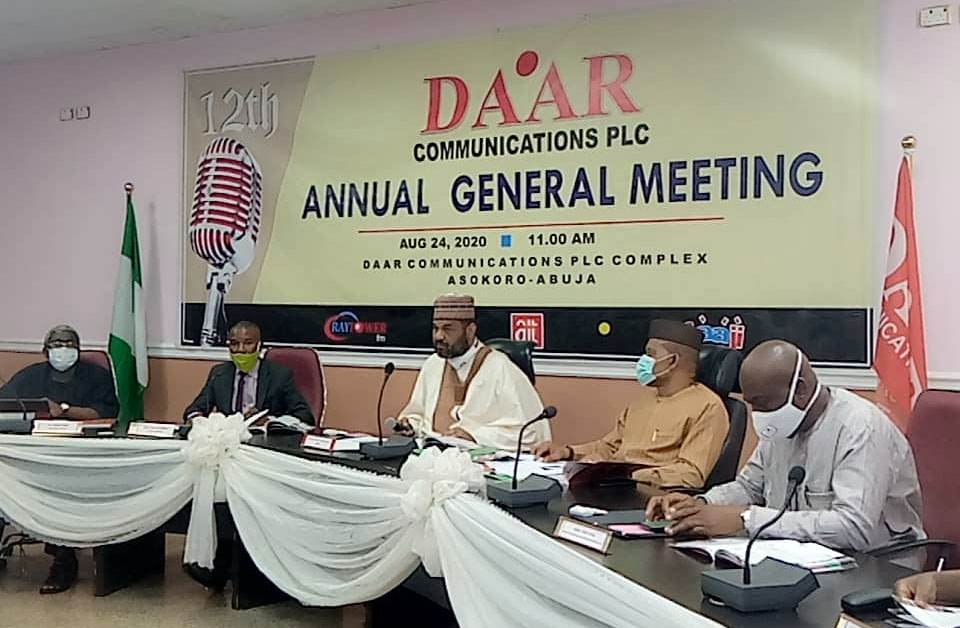
Dokpesi Jr, Ex-GMD Akiotu Clash Over DAAR Communications Mgt Restructuring
A public dispute has erupted at DAAR Communications Plc as Chairman Raymond Dokpesi Jr and former Group Managing Director, High Chief Tony Akiotu, publicly clashed over the company’s recent management restructuring, raising questions about corporate governance and the legacy of Nigeria’s pioneering media organisation.
Speaking in Abuja, Dokpesi Jr defended the executive shake-up, stating he has “no regrets” about the decisions made following the sudden death of the company’s founder, Raymond Aleogho Dokpesi Sr. He described the departure of long-serving executives as a difficult but necessary step to ensure stability, investor confidence, and future growth. The chairman noted that the company faced challenges after his father’s passing, including declining share value and reduced investor confidence, and emphasised that the transition process was carefully managed to minimise tension.
READ ALSO:
- EFCC Holds El-Rufai Overnight Over ₦423bn Kaduna Corruption Allegations
- Troops Intercept ₦37m Terror Funds, Phones, ISWAP Logistics in Borno Operations
- X Restored After Global Outage Disrupts Millions Worldwide
Dokpesi Jr acknowledged that the exiting executives were owed salary arrears and other entitlements, which the organisation has been settling, amounting to billions of naira accumulated over their 15-year tenure. He explained that the restructuring allowed the company to prioritise outstanding obligations and improve operational efficiency, with most business units now financially independent and others expected to achieve autonomy before the end of the year. “I will continue to apologise to Mr Tony Akiotu and the affected management staff for any hurt feelings,” he said, “but I have no regrets — the results validate the decision.”
In response, Akiotu criticised Dokpesi Jr’s statement as unfair and misleading. He argued that it was inappropriate for a chairman who presided over board meetings and approved management memos to later accuse the same leadership team of mismanagement. Akiotu highlighted that all major operational and financial decisions during his tenure were subject to board approval, and that the team had contributed significantly to the company’s growth into a national and international media brand, with operations spanning Nigeria, the United Kingdom, and the United States.
Akiotu also noted that while executive retirements may be permissible under corporate regulations, the public portrayal of their tenure overlooked the sacrifices made to build one of Nigeria’s pioneering broadcast institutions. “If Raymond Dokpesi Jr believes we played no part in the growth of the company, we leave it to Nigerians and history to make that judgment,” he said.
Industry observers say the dispute underscores ongoing debates about corporate governance, leadership succession, and strategic reform within DAAR Communications, which continues to be a major player in Nigeria’s broadcast media sector. Both parties have called for dialogue, but the public nature of the clash has drawn attention across the media and business community, with speculation over potential boardroom changes and the company’s future direction.
Dokpesi Jr, Ex-GMD Akiotu Clash Over DAAR Communications Mgt Restructuring
Business
Inflation Slows to 15.10% as Food Prices Eased in January
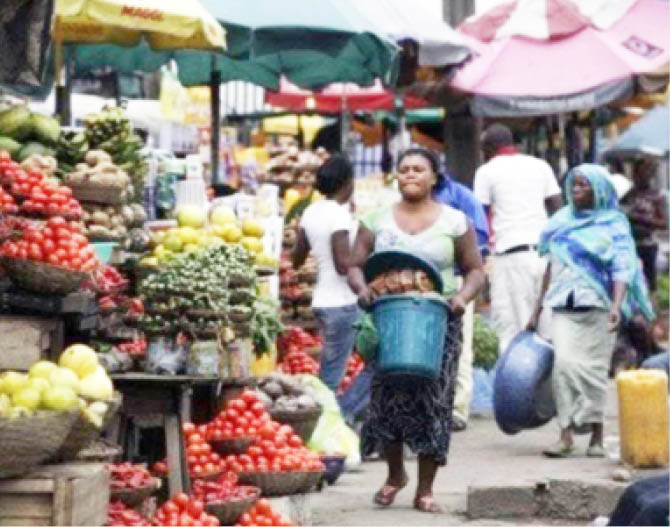
Inflation Slows to 15.10% as Food Prices Eased in January
Nigeria’s inflation rate recorded a marginal decline to 15.10 per cent in January 2026, signalling a slight moderation in consumer prices at the start of the year.
Latest data released on Monday by the National Bureau of Statistics (NBS) showed that headline inflation dipped from 15.15 per cent in December 2025, reflecting a 0.05 percentage point decrease.
The NBS, in its January Consumer Price Index (CPI) report, also revealed that food inflation — a key driver of household spending pressures — eased significantly to 8.89 per cent in January, down from 10.84 per cent recorded in December.
According to the bureau, the CPI dropped to 127.4 points in January from 131.2 points in the preceding month, representing a 3.8-point decline.
On a month-on-month basis, inflation fell sharply to -2.88 per cent in January, compared to 0.54 per cent in December — a 3.42 percentage point swing.
This indicates that the average price level not only slowed but contracted within the month under review.
“The Consumer Price Index (CPI) declined to 127.4 in January 2026, reflecting a 3.8-point decrease from the preceding month (131.2),” the NBS stated.
It added, “In January 2026, the headline inflation rate eased to 15.10%, down from 15.15% in December 2025.
“On a month-on-month basis, the headline inflation rate in January 2026 was -2.88%, which was 3.42% lower than the rate recorded in December 2025 (0.54%).”
The moderation in both headline and food inflation may offer cautious optimism for households and policymakers, particularly amid ongoing economic reforms and cost-of-living concerns.
However, analysts note that while the decline suggests easing price pressures, the overall inflation rate remains elevated, keeping purchasing power under strain.
-

 Education2 days ago
Education2 days agoCheck Your Name: UNILORIN Releases Updated NELFUND Refund List for 2024/2025 Students
-

 News2 days ago
News2 days agoOsogbo Sons and Daughters Mark 5th Anniversary with Awards, Political Undertones
-

 metro23 hours ago
metro23 hours agoUS Freezes Assets of Eight Nigerians Over Boko Haram, ISIL, Cybercrime Links
-

 metro3 days ago
metro3 days agoWoman Arrested Over Murder of Nigerian E-Hailing Driver in South Africa
-

 metro3 days ago
metro3 days agoBoko Haram Terrorists Release Video of 176 Abducted Kwara Residents
-

 News2 days ago
News2 days agoAfenifere Calls for Immediate Take-Off of State Police as Terror Threats Rise in Yorubaland
-

 metro24 hours ago
metro24 hours agoTerror in Lagos Traffic: Cutlass Gang Unleashes Mayhem on Mile 12–Ketu Road
-

 metro2 days ago
metro2 days agoUS Military Boosts Support for Nigeria’s Fight Against Insurgency With Ammunition, Troop





